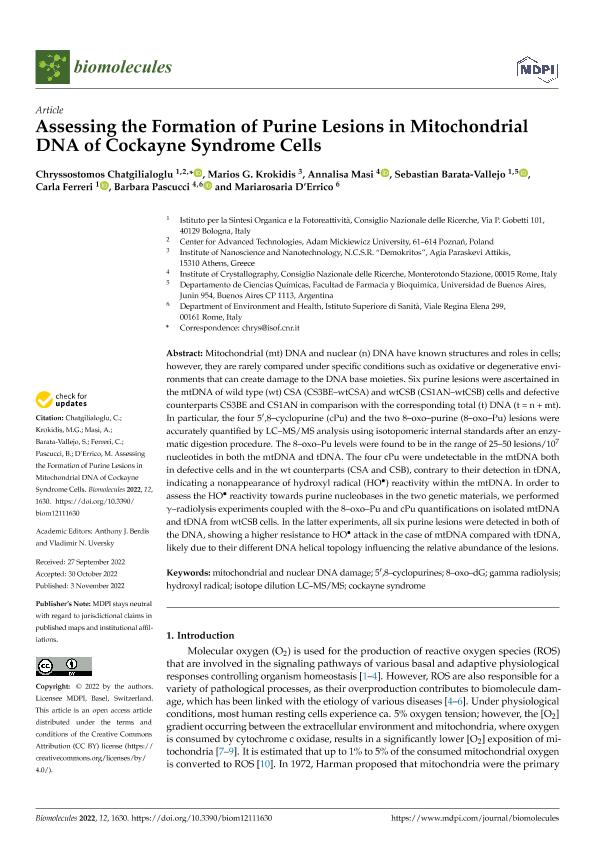Mostrar el registro sencillo del ítem
dc.contributor.author
Chatgilialoglu, Chryssostomos

dc.contributor.author
Krokidis, Marios G.
dc.contributor.author
Masi, Annalisa
dc.contributor.author
Barata Vallejo, Sebastian

dc.contributor.author
Ferreri, Carla

dc.contributor.author
Pascucci, Barbara
dc.contributor.author
D?Errico, Mariarosaria
dc.date.available
2023-11-03T18:57:38Z
dc.date.issued
2022-11
dc.identifier.citation
Chatgilialoglu, Chryssostomos; Krokidis, Marios G.; Masi, Annalisa; Barata Vallejo, Sebastian; Ferreri, Carla; et al.; Assessing the Formation of Purine Lesions in Mitochondrial DNA of Cockayne Syndrome Cells; MDPI; Biomolecules; 12; 11; 11-2022; 1-14
dc.identifier.issn
2218-273X
dc.identifier.uri
http://hdl.handle.net/11336/217032
dc.description.abstract
Mitochondrial (mt) DNA and nuclear (n) DNA have known structures and roles in cells; however, they are rarely compared under specific conditions such as oxidative or degenerative environments that can create damage to the DNA base moieties. Six purine lesions were ascertained in the mtDNA of wild type (wt) CSA (CS3BE–wtCSA) and wtCSB (CS1AN–wtCSB) cells and defective counterparts CS3BE and CS1AN in comparison with the corresponding total (t) DNA (t = n + mt). In particular, the four 5′,8–cyclopurine (cPu) and the two 8–oxo–purine (8–oxo–Pu) lesions were accurately quantified by LC–MS/MS analysis using isotopomeric internal standards after an enzymatic digestion procedure. The 8–oxo–Pu levels were found to be in the range of 25–50 lesions/107 nucleotides in both the mtDNA and tDNA. The four cPu were undetectable in the mtDNA both in defective cells and in the wt counterparts (CSA and CSB), contrary to their detection in tDNA, indicating a nonappearance of hydroxyl radical (HO•) reactivity within the mtDNA. In order to assess the HO• reactivity towards purine nucleobases in the two genetic materials, we performed γ–radiolysis experiments coupled with the 8–oxo–Pu and cPu quantifications on isolated mtDNA and tDNA from wtCSB cells. In the latter experiments, all six purine lesions were detected in both of the DNA, showing a higher resistance to HO• attack in the case of mtDNA compared with tDNA, likely due to their different DNA helical topology influencing the relative abundance of the lesions.
dc.format
application/pdf
dc.language.iso
eng
dc.publisher
MDPI
dc.rights
info:eu-repo/semantics/openAccess
dc.rights.uri
https://creativecommons.org/licenses/by/2.5/ar/
dc.subject
5′,8–CYCLOPURINES
dc.subject
8–OXO–DG
dc.subject
COCKAYNE SYNDROME
dc.subject
GAMMA RADIOLYSIS
dc.subject
HYDROXYL RADICAL
dc.subject
ISOTOPE DILUTION LC–MS/MS
dc.subject
MITOCHONDRIAL AND NUCLEAR DNA DAMAGE
dc.subject.classification
Química Orgánica

dc.subject.classification
Ciencias Químicas

dc.subject.classification
CIENCIAS NATURALES Y EXACTAS

dc.title
Assessing the Formation of Purine Lesions in Mitochondrial DNA of Cockayne Syndrome Cells
dc.type
info:eu-repo/semantics/article
dc.type
info:ar-repo/semantics/artículo
dc.type
info:eu-repo/semantics/publishedVersion
dc.date.updated
2023-11-02T14:40:56Z
dc.journal.volume
12
dc.journal.number
11
dc.journal.pagination
1-14
dc.journal.pais
Suiza

dc.journal.ciudad
Basilea
dc.description.fil
Fil: Chatgilialoglu, Chryssostomos. Adam Mickiewicz University; Polonia
dc.description.fil
Fil: Krokidis, Marios G.. No especifíca;
dc.description.fil
Fil: Masi, Annalisa. Consiglio Nazionale delle Ricerche; Italia
dc.description.fil
Fil: Barata Vallejo, Sebastian. Consejo Nacional de Investigaciones Científicas y Técnicas; Argentina. Universidad de Buenos Aires. Facultad de Farmacia y Bioquímica; Argentina
dc.description.fil
Fil: Ferreri, Carla. Istituto Per la Sintesi Organica E la Fotoreattivita; Italia
dc.description.fil
Fil: Pascucci, Barbara. Consiglio Nazionale delle Ricerche; Italia
dc.description.fil
Fil: D?Errico, Mariarosaria. Istituto Superiore di Sanità; Italia
dc.journal.title
Biomolecules
dc.relation.alternativeid
info:eu-repo/semantics/altIdentifier/doi/http://dx.doi.org/10.3390/biom12111630
Archivos asociados
